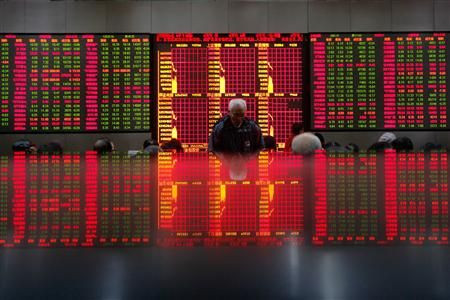Asian Markets Gain On Upbeat US Data

Most of the Asian stocks rose Friday with investor sentiment turning positive as a drop in the U.S. jobless claims indicated an improvement in the labor market in the world’s largest economy.
The Chinese Shanghai Composite gained 0.49 percent or 10.38 points to 2113.25. Hong Kong's Hang Seng was up 0.76 percent or 160.52 points to 21159.57. Among major gainers were Sands China Ltd (5.12 percent) and COSCO Pacific Ltd (3.75 percent).
Japan's Nikkei Stock Average was up 0.18 percent or 15.50 points to 8562.28. Among major gainers were Pioneer Corp (5.03 percent), Advantest Corp (4.20 percent) and JTEKT Corp (3.87 percent).
South Korea’s KOSPI Composite Index rose 0.12 percent or 2.35 points to 1935.44. Shares of Samsung Electronics Co Ltd dropped 0.69 percent and shares of LG Electronics Inc gained 1.64 percent.
India's BSE Sensex fell 0.35 percent or 65.90 points to 18738.85. Among the major losers were Infosys (7.17 percent), Suzlon Energy Ltd (1.23 percent) and Wipro Ltd (1.07 percent).
Market confidence went up on the U.S. Labor Department's weekly jobless claims data report Thursday showing an upswing in the jobs market. The initial jobless claims report, which measures the number of individuals who filed for unemployment insurance for the first time last week, rose to 339,000 in the week ending Oct. 6, down from 367,000 in the previous week.
Meanwhile, the Monetary Authority of Singapore (MAS) left its policy stance unchanged on Friday. “Prospects for a robust recovery are low. The launch of a third round of quantitative easing by the US Fed and the unveiling of a bond-buying programme by the European Central Bank may have given financial markets a lift, but the global economic outlook remains bleak,” Daniel Martin, an economist at Capital Economics, said in a note.
Though the Singapore economy contracted for the third quarter, the MAS desisted the loosening of monetary policy since inflation has remained persistently high. According to MAS, inflation is still a bigger concern than the poor growth outlook.
© Copyright IBTimes 2024. All rights reserved.





















